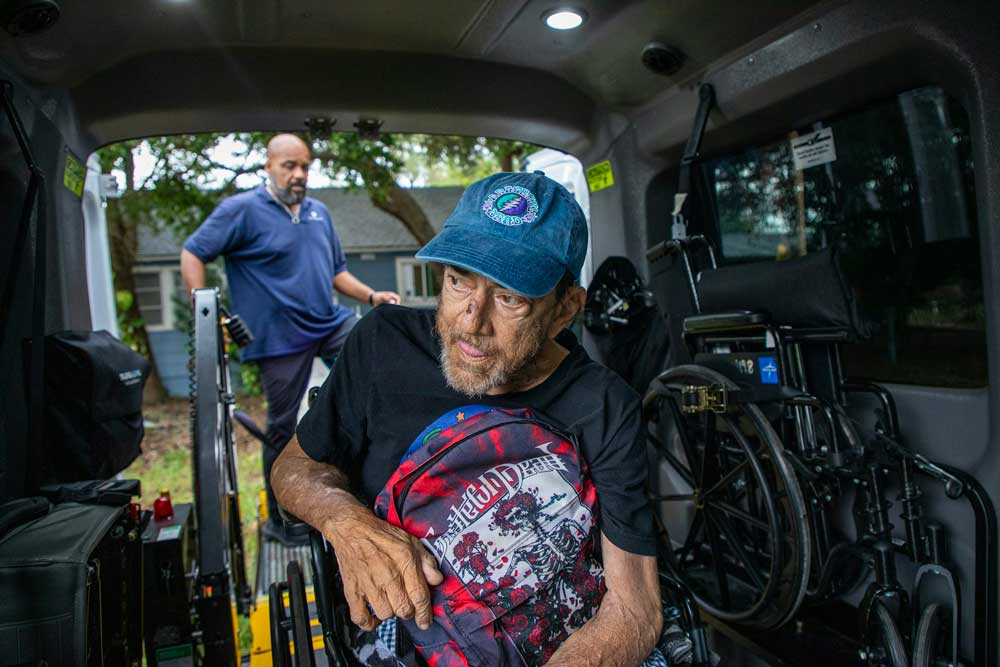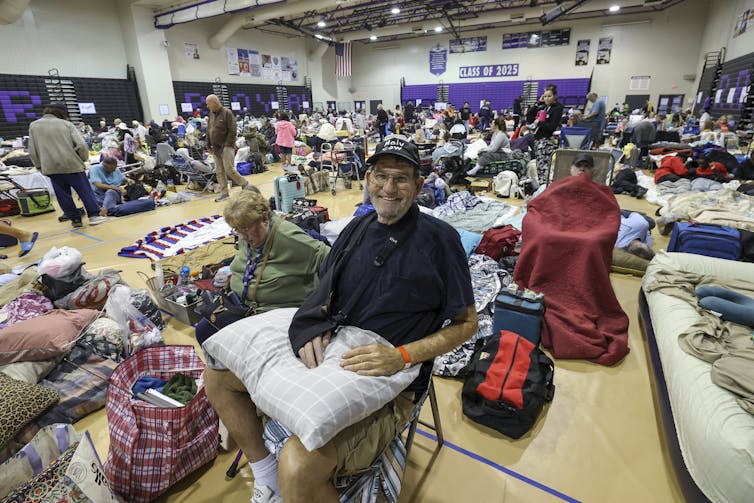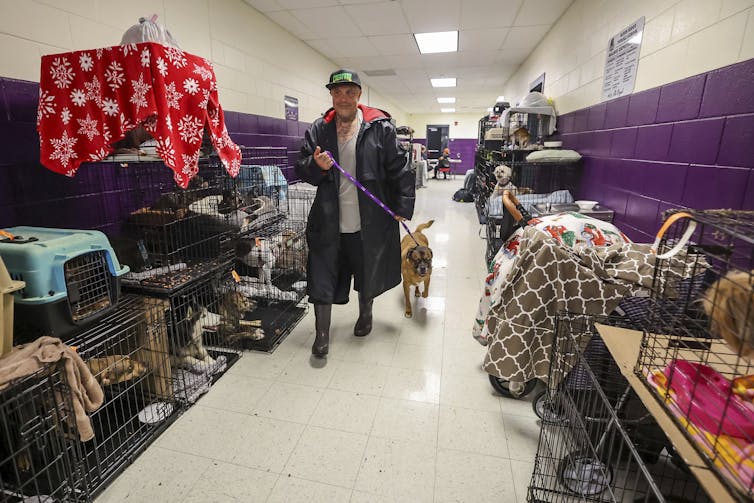
By Carson MacPherson-Krutsky
As Hurricane Milton roared ashore near Sarasota, Florida, tens of thousands of people were in evacuation shelters. Hundreds of thousands more had fled coastal regions ahead of the storm, crowding highways headed north and south as their counties issued evacuation orders.
But not everyone left, despite dire warnings about a hurricane that had been one of the strongest on record two days earlier.
As Milton’s rain and storm surge flooded neighborhoods late on Oct. 9, 2024, 911 calls poured in. In Tampa’s Hillsborough County, more than 500 people had to be rescued, including residents of an assisted living community and families trapped in a flooding home after a tree crashed though the roof at the height of the storm.
In Plant City, 20 miles inland from Tampa, at least 35 people had been rescued by dawn, City Manager Bill McDaniel said. While the storm wasn’t as extreme as feared, McDaniel said his city had flooded in places and to levels he had never seen. Traffic signals were out. Power lines and trees were down. The sewage plant had been inundated, affecting the public water supply.
Evacuating might seem like the obvious move when a major hurricane is bearing down on your region, but that choice is not always as easy as it may seem.
Evacuating from a hurricane requires money, planning, the ability to leave and, importantly, a belief that evacuating is better than staying put.
I recently examined years of research on what motivates people to leave or seek shelter during hurricanes as part of a project with the Federal Emergency Management Agency and the Natural Hazards Center. I found three main reasons that people didn’t leave.
Evacuating can be expensive
Evacuating requires transportation, money, a place to stay, the ability to take off work days ahead of a storm and other resources that many people do not have.
With 1 in 9 Americans facing poverty today, many have limited evacuation options. During Hurricane Katrina in 2005, for example, many residents did not own vehicles and couldn’t reach evacuation buses. That left them stranded in the face of a deadly hurricane. Nearly 1,400 people died in the storm, many of them in flooded homes.
When millions of people are under evacuation orders, logistical issues also arise.
Gas shortages and traffic jams can leave people stranded on highways and unable to find shelter before the storm hits. This happened during Hurricane Floyd in 1999 as 2 million Floridians tried to evacuate.
People who experienced past evacuations or saw news video of congested highways ahead of Hurricane Milton might not leave for fear of getting stuck.
Health, pets and being physically able to leave
The logistics of evacuating are even more challenging for people who are disabled or in nursing homes. Additionally, people who are incarcerated may have no choice in the matter – and the justice system may have few options for moving them.
Evacuating nursing homes, people with disabilities or prison populations is complex. Many shelters are not set up to accommodate their needs. In one example during Hurricane Floyd, a disabled person arrived at a shelter, but the hallways were too narrow for their wheelchair, so they were restricted to a cot for the duration of their stay. Moving people whose health is fragile, and doing so under stressful conditions, can also worsen health problems, leaving nursing home staff to make difficult decisions.

AP Photo/Mike Carlson
But failing to evacuate can also be deadly. During Hurricane Irma in 2017, seven nursing home residents died in the rising heat after their facility lost power near Fort Lauderdale, Florida. In some cases, public water systems are shut down or become contaminated. And flooding can create several health hazards, including the risk of infectious diseases.
In a study of 291 long-term care facilities in Florida, 81% sheltered residents in place during the 2004 hurricane season because they had limited transportation options and faced issues finding places for residents to go.

AP Photo/Mike Carlson
People with pets face another difficult choice – some choose to stay at home for fear of leaving their pet behind. Studies have found that pet owners are significantly less likely to evacuate than others because of difficulties transporting pets and finding shelters that will take them. In destructive storms, it can be days to weeks before people can return home.
Risk perception can also get in the way
People’s perceptions of risk can also prevent them from leaving.
A series of studies show that women and minorities take hurricane risks more seriously than other groups and are more likely to evacuate or go to shelters. One study found that women are almost twice as likely than men to evacuate when given a mandatory evacuation order.
If people have experienced a hurricane before that didn’t do significant damage, they may perceive the risks of a coming storm to be lower and not leave.
In my review of research, I found that many people who didn’t evacuate had reservations about going to shelters and preferred to stay home or with family or friends. Shelter conditions were sometimes poor, overcrowded or lacked privacy.
People had fears about safety and whether shelter environments could meet their needs. For example, religious minorities were not sure whether shelters would be clean, safe, have private places for religious practice, and food options consistent with faith practices. Diabetics and people with young children also had concerns about finding appropriate food in shelters.
How to improve evacuations for the future
There are ways leaders can reduce the barriers to evacuation and shelter use. For example:
- Building more shelters able to withstand hurricane force winds can create safe havens for people without transportation or who are unable to leave their jobs in time to evacuate.
- Arranging more shelters and transportation able to accommodate people with disabilities and those with special needs, such as nursing home residents, can help protect vulnerable populations.
- Opening shelters to accommodate pets with their owners can also increase the likelihood that pet owners will evacuate.
- Public education can be improved so people know their options. Clearer risk communication on how these storms are different than past ones and what people are likely to experience can also help people make informed decisions.
- Being prepared saves lives. Many areas would benefit from better advance planning that takes into account the needs of large, diverse populations and can ensure populations have ways to evacuate to safety.
![]()
Carson MacPherson-Krutsky is a Research Associate at the Natural Hazards Center at the University of Colorado Boulder.





























Terry John Melton says
Really? Evacuate? Three interstates were jammed with traffic fleeing this storm, 4, 75, 95. This is called impassable highway., with people sitting running out of gas. And probably no gas stations with fuel. God help us if there is an evacuation in the event of nuclear war. 23 million Floridians will be trapped. Yes, right…. evacuate.
Pierre Tristam says
Not to diminish the point about traffic nightmares in evacuations, which are as real as Terry describes, but in case of nuclear war, where would we evacuate to? If areas of Florida were targeted, chances are that other places would be targeted. There would be evacuations–nowhere to seek help, and nowhere from where help would be forthcoming. Hurricanes, in this scenario, look like a summer afternoon’s drizzle on the way to a nice day at the beach.
Shark says
You can’t fix stupid. People had advanced notice but they chose to wait until the last minute.